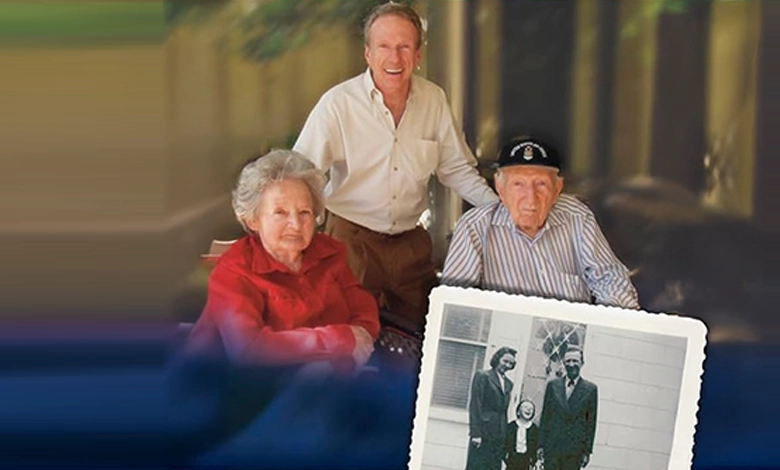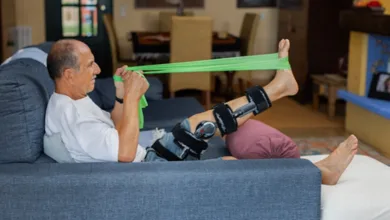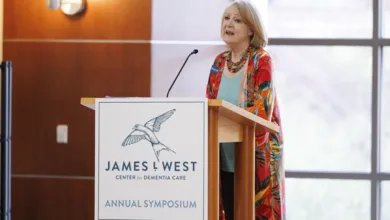When the Child Becomes the Caregiver

Parenting his parents became the most important thing Jim Comer ever did.
For those of us lucky enough to still have parents, here’s an inevitable truth: The people who once cared for us will someday need our care.
That’s what happened to Jim Comer nearly 30 years ago when his father suffered a stroke. Comer was 51 at the time, working in California as a speechwriter and speech coach.
That medical emergency led Comer to leave his career in California, relocate to Texas, and take on the immense challenge of caring for both parents—his mother was already suffering from dementia.
It’s a situation that many Americans deal with today: According to a 2017 study by the Center for Retirement Research at Boston College, 6% of adult children serve as caregivers, and 17% will take on this role at some point in their lives.
From zero to complete caregiver in 24 hours
“My world changed instantly and forever,” said Comer, who now lives in Georgetown, Texas. “I was in Texas the next day and had to make scores of decisions—from zero caregiver to complete caregiver—and I had to get my father in rehab and my mother into care as well.”
After touring communities, he was lucky enough to find a good fit in the Austin area that provided both assisted living for his mother and skilled nursing for his dad. Fortunately, his then-88-year-old father made a complete recovery from the stroke. Comer’s father later moved into independent living and used his experience as a salesman to persuade the community to admit his wife, too.
“He got my mother in,” Comer said with a laugh, “and he convinced them that he could care for her with her dementia—even though she really didn’t fit the profile for independent living.”
Comer calls their four-and-a-half years together in that retirement community a “pink cloud”—the arrangement was going great. But that changed in late 2000 when his mother broke her hip. It required her to move into a skilled nursing and rehab community. His father fell seven months later and also needed skilled nursing. Comer’s father lived several more years, passing in 2015 at age 95. His mother lived in that care community for 10 years and passed in 2010 at age 97.
Be Kind, Stay Flexible, Enter Their World
The years Comer spent ensuring his parents’ well-being were filled with challenges as well as funny moments, which he recounts in his book When Roles Reverse: A Guide to Parenting Your Parents. In addition to sharing his story—and what being a caregiver really means, the book offers a wealth of insights on preparing for and navigating this stage of life.
Here are a few of Comer’s most valuable pieces of wisdom:
Adjust your expectations.
“Don’t expect them to ever be the way they were,” he said. “If they begin behaving differently or in a way you don’t like, remember, it’s not them. It’s the disease. It’s the condition. And so, you need to separate them from the condition.”
Be kind.
“Go for kindness every time,” Comer said. “You can’t go wrong by being kind. I mean, it doesn’t matter if they get things factually wrong. Who cares? It doesn’t matter if they think you’re the brother. Be the brother.”
Keep your sense of humor.
“Improvisation is really, really important as a caregiver,” said Comer, who once used ice cream to persuade his mother to move into a care community. “You’re not going to always know what to do because there are no simple answers. You may not know what to do? You’ve got to try different things, and you try one—it may work.”
Comer’s favorite piece of advice for caregivers? Quit trying to bring the person you’re caring for into your world. In other words, surrender to the uncertainty and understand that it won’t get better.
“You have to go into their world,” he said.
The whole experience, Comer said, was the most important thing he has ever done.
“I tried to be rich and famous all my life, and it turns out that the best thing I ever did was showing up for my parents when they needed me,” he said.
“Being a caregiver is a really big deal. It’s not fancy. You’re not going to get laudable reviews or headlines from the world. But at the end of the day, you will have done what you should have done for the people who loved you most. You’ll have shown up for them when they needed you most.”





